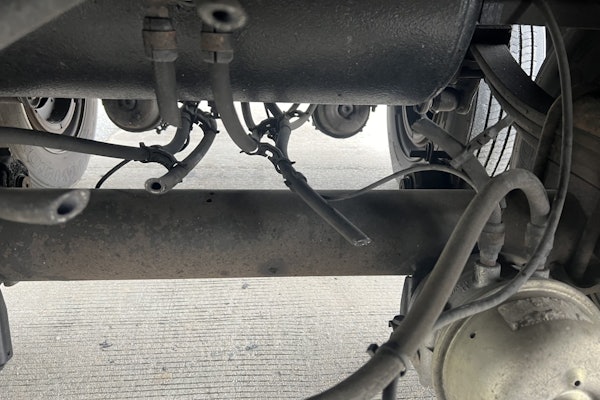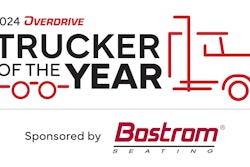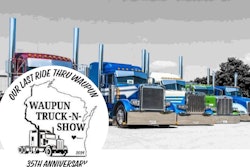Signing on with a carrier is similar to getting married: You should know the carrier well before you commit. Just as it is in matrimony, dissatisfaction with your partner leads to problems, and splitting up can be costly.
The best way to avoid irreconcilable differences is to ask questions early in the relationship, says Tom Weakley, operations director of the Owner-Operator Independent Drivers Association.
“A lot of carriers discourage questions, but a good owner-operator is going to ask a lot of questions,” Weakley said. Owner-operators’ biggest complaint “is the reluctance of management to get down to the nitty-gritty. They want to give generalities.”
Paul Taylor, a Burnsville, Minn., attorney who specializes in trucking law and employment, says the first question owner-operators have is how fast a carrier pays. Federal regulations require carriers to pay within 15 days after paperwork is submitted, but some carriers fall short of that.
Experienced owner-operators say other truckers provide the best information. Bruce Bryant, Overdrive’s 2008 Trucker of the Year, says truckers often approach him on the road, by CB or face-to-face with questions about his carrier, Landstar Systems. “If they’re not happy, they’re willing to tell you,” the Alabama resident says.
A driver can be jaded about a certain carrier, so get several opinions to ensure your information is not skewed.
Other truckers are also a good source for how much a carrier pays for typical loads, says Wayne Brown, who worked with moving and trade shows in his 14 years with Bekins Van Lines.
You can also discuss matters that a company representative might not be so candid about, such as available miles, preference for company drivers over owner-operators, pressure to accept loads you don’t want and to violate hours of service.
Think of beginning a dialogue with your carrier to develop trust, just as marriage partners do. To start that process, here are some useful questions to ask a prospective carrier.
1 What company
representative can I talk to besides the recruiter?
Find a terminal manager or dispatcher. Someone in such a position can provide more accurate specifics on matters such as average pay, says Jim Stewart, a long-time owner-operator. “If he can’t take the time to talk, you don’t want to work for them,” the Georgia resident says. “Go down there because it’s better to have a face-to-face with someone.”
2 What is the driver turnover?
Turnover exceeding 100 percent is not good, but neither is it uncommon. While turnover averages for large truckload carriers peaked at 136 percent in late 2004 and 2005, it was below 100 percent during parts of 2008 as the economy weakened. Turnover rates give you a general way to compare driver satisfaction among carriers.
3 Is your company financially solvent?
Carriers are not immune to the troubles shaking the rest of the economy. Their bankruptcies increased 130 percent through the first half of 2008 compared with the same period in 2007, according to the American Trucking Associations.
“Ask the company to provide a credit reference,” advises Taylor. Or you can use a credit reporting company such as Dun & Bradstreet, which provides company reports starting at $39.99 at www.dnb.com.
4 Where does most of your freight run?
Make sure the typical lanes are compatible with where you live and the kind of schedule you’d prefer. If the carrier delivers to New York City or other unpopular destinations, see if there are bonuses or higher pay rates attached.
5 What freight will I haul?
If you haven’t had experience with a type of freight the carrier hauls, ask other owner-operators about the pluses and minuses of hauling it, especially if it involves a type of trailer you’ve not pulled before.
6 Will certain loads require special attention and, if so, how is compensation handled for it?
Freight requiring special care, such as over-dimensional loads, might pay very well, but it often comes with additional costs. If you are willing to be responsible for such freight, make sure you understand the costs and who bears them. This could involve 24-hour surveillance, escorts or special securement.
7 How often will I get home time?
Some larger fleets have the flexibility to offer different arrangements. For example, Barr-Nunn Transportation’s plan for weekends home varies, depending if the owner-operator is part of the over-the-road, regional fleet or home time fleet. Compare the company’s response with what its leased operators say.
8 What does the average load pay?
Some carriers go into detail on their website, but if not, ask carrier representatives and owner-operators leased to the carrier. For mileage pay, make sure you understand what system is used for estimating miles. For percentage of gross revenue pay, learn exactly how your share is computed, such as, whether paid detention time is represented in your percentage.
9 What percentage of miles is deadhead and what is the pay, if any, for deadhead?
Excessive deadhead without proper compensation can break your operation, especially when fuel is high.
10 Do you pay for detention time or other delays?
Situations you might be compensated for that are out of your control are canceled loads, multiple pick-ups and drops and layovers. Compensation for detention became more common after the last revision to the hours of service rule.
11 Who pays for tolls, license base plates, liability insurance, cargo insurance, required equipment, road use taxes, physicals and drug tests?
Remember, any charge-backs are required to be specified in the lease and carriers are prohibited from forcing an owner-operator to buy anything from the carrier. The costs you incur on these items will affect your bottom line, so calculate the impact as you compare carriers’ financial packages.
12 Can I participate in discount programs for fuel tires and parts?
Find out the value of the discounts and the size of the network.
13 Are all fuel surcharges the carrier receives passed on to me and documented in the settlement?
It’s not uncommon for leases to fail to mention fuel surcharges, Taylor says. Charges can vary considerably and usually change weekly, based on the U.S. Department of Energy’s average price data. Ethically, a company should pass all of these charges to the owner-operator, but there is no legal requirement to do so. Major carriers’ websites often have information on their surcharge formulas.
14 How do you handle fuel tax reporting?
Procedures vary on this. C.R. England Trucking Co. deducts 1.5 cents per mile for dispatched miles for quarterly fuel/road tax. The deduction is reconciled quarterly and owner-operators who fuel at its designated stops usually receive a refund, the company website says.
Schneider National’s website says the company will file fuel tax reports on behalf of its owner-operators. The carrier applies owner-operator cash credits monthly to fuel tax charges the owner-operator may owe.
Larry Lee, a Georgia owner-operator for ten years, says he’s heard that some carriers charge $10 to $15 per week for this, although he has never been with a carrier that required him to pay for this service.
15 Can I have a copy of the lease to review before signing?
Many carriers won’t allow an owner-operator to take a copy of the lease off the premises to review before signing, Stewart says. “If they tell you no or put you off, that’s a red flag to me,” he says.
Weakley says too many owner-operators don’t see the lease until after two or three days of orientation, when truckers are anxious to sign and get on the road.
Carrier leases are written to favor the company, says Dallas transportation and employment attorney William Allred. If you find a lease term that might be negotiable, mark changes and initial it, he recommends. Then see if the company will sign it. “It all comes down to if they need you,” Allred says. “If they do, they will work with you.”
Some owner-operators are remiss in reading a lease before signing. In addition to possibly having too much legalese, some leases can be intimidating because of their length. Bryant estimates the two-page lease he signed nearly 23 years ago with Landstar now exceeds 40 pages.
If you get a copy of a lease for review, get an attorney or other qualified person to review it. Members of the Owner-Operator Independent Drivers Association can fax or mail a lease to the association for comment.
16 Is there a hold-harmless provision?
Be aware of these clauses, which a carrier can use to shift liability for an accident to the owner-operator. This clause should be especially avoided if you have driver employees.
17 How do you resolve complaints?
Some carriers have more structured procedures than others for handling owner-operator problems. Bryant says he has used Landstar’s contractor services to successfully resolve 99 percent of problems, such as a payment amount. Some larger fleets have owner-operator advisory boards that maintain dialog with management to minimize problems.
18 What does the lease say about arbitration?
An increasing number of leases have arbitration clauses. In arbitration, an independent contractor often is required to pay half the cost of trying to negotiate a dispute, Taylor says. In some cases, you could lose the right to your day in court if you arbitrate. Laws vary by state.
19 Is there a non-compete clause?
Some leases have provisions that can prevent you from going to work for a competitor for a certain period after leaving. Bryant says he wouldn’t agree to such a term. “You limit yourself,” he says.
20 What are the terms for any escrows and how is disbursement handled when I leave?
Money you place in one or more escrow accounts could mount into the thousands of dollars, so you want to know how it’s handled. By law, the lease must define all fees and reimbursements carriers can take from owner-operator escrows.
Lee says it is not unusual for carriers and owner-operators to disagree on how much the carrier keeps for damage to cargo or equipment. Truckers often give up rather than go to the trouble of fighting the matter.
21 What is your lumper and loading/unloading policy?
Some carriers provide a set fee. Others reimburse for lumping with receipts. If you have to load or unload, you should be compensated.
22 What is the rider/pet policy?
Each carrier’s policy is largely dependent on the terms of its insurance. Jim Palmer Trucking, for example, allows pets and immediate family as riders, but persons 12 and younger during summer months only.









